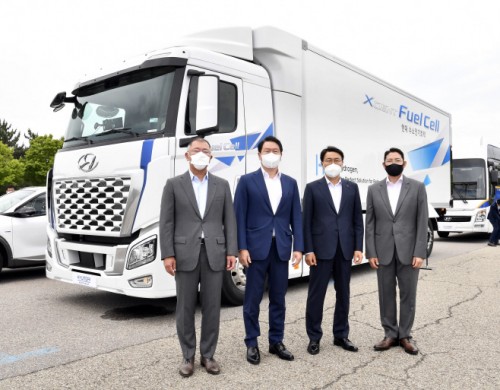 |
| From left, Hyundai Motor Group Chairman Chung Euisun, SK Group Chairman Chey Tae-won, POSCO Group Chairman Choi Jeong-woo and Hyosung Group Chairman Cho Hyun-joon pose for a commemorative photo in front of Hyundai Motor’s hydrogen electric truck on June 10, 2021./ Source: Hyundai Motor Group |
AsiaToday reporter Kim Byung-hoon
South Korea’s four major conglomerates – Hyundai Motor, SK, POSCO and Hyosung – will team up to launch a consultation body for the local hydrogen economy and carbon neutrality.
In response to Hyundai Motor Group Chairman Chung Euisun’s proposal, SK Group Chairman Chey Tae-won and POSCO Chairman Choi Jeong-woo showed support creating so-called the ‘K-hydrogen alliance,’ in which Hyosung Chairman Cho Hyun-joon joined later. The four conglomerates will launch the consultative body in September to encourage corporate investments and expand the hydrogen industry’s value chain.
The four leaders met Thursday at Hyundai Motor Group’s Namyang Research & Development Center in Hwaseong to discuss ways to set up a consultative body on hydrogen, according to Hyundai Motor on Thursday. Earlier this year, Hyundai Motor, SK Group and POSCO Group realized the need for cooperation with private companies to revitalize the hydrogen economy and reality carbon neutrality, and agreed to launch the Korean version of the Hydrogen Council, a global coalition of CEOs committed to expediting the energy transition with hydrogen. Then Hyosung Group announced its intention to join the council, leading to the meeting on Thursday.
Hyundai Motor Group, SK Group and POSCO Group will serve as co-chairs of the new consultative body. Hyosung and the other three conglomerates will encourage additional participation of companies that are either operating or planning hydrogen-related projects and investments. They plan to officially launch the consultative body in September after finalizing participating companies by July. The consultative body will play a key role in realizing the hydrogen society by encouraging corporate investments and expanding the hydrogen industry’s value chain.
Chairman Chung said, “While establishing this new alliance, (Hyundai Motor Group) will continue its cooperation with local firms to contribute to expanding hydrogen energy and hastening the advent of hydrogen society.” SK Group’s Chey said, “It is important for companies to take on an entrepreneurial role in achieving the hydrogen economy.” He also said that SK Group will “work hard so that South Korea could become a leader in the global hydrogen industry.”
POSCO’s Choi said, “The hydrogen economy cannot be achieved by POSCO alone. The industrial circles should join forces to contribute to the country’s development and transition to carbon neutrality.” Hyosung Group Chairman Cho shared its plan “to establish a hydrogen value chain by localizing part required to build hydrogen stations and hydrogen supply facilities.”
The four conglomerates that led the consultative body have worked hard to expand the base of the local hydrogen industry. Hyundai Motor Group is leading the global market by mass-producing the world’s first hydrogen fuel-cell electric vehicles in 2013. The group plans to annually produce 0.5 million hydrogen fuel-cell electric vehicles and 0.7 million hydrogen-based fuel cell system.
SK Group last year set up an in-house unit dedicated to hydrogen business projects. By 2025, the group plans to establish a value chain covering hydrogen production, distribution and consumption in order to become the world’s No. 1 hydrogen energy company. It plans to increase its hydrogen production to 280,000 tons, from 30,000 tons in 2023.
POSCO Group aims to expand its annual hydrogen production capacity to 5 million tons by 2050, while achieving 30 trillion won in annual sales by then. By 2050, it aims to reduce carbon emissions to zero by developing an eco-friendly hydrogen-reducing steelmaking method.
Hyosung Group has also been promoting the establishment of a value chain covering from hydrogen production to supply. It will secure facilities in Ulsan, which can annually produce 13,000 tons of liquefied hydrogen, while building hydrogen stations in 30 regions across the country.
“Along with the establishment of the hydrogen council, we will put further efforts on hydrogen-related projects to lead the era of decarbonization,” a Hyundai Motor Group official said.
#Hyundai Motor #SK #POSCO #Hyosung #Hydrogen Council
Copyright by Asiatoday
Most Read
-
1
-
2
-
3
-
4
-
5
-
6
-
7





















